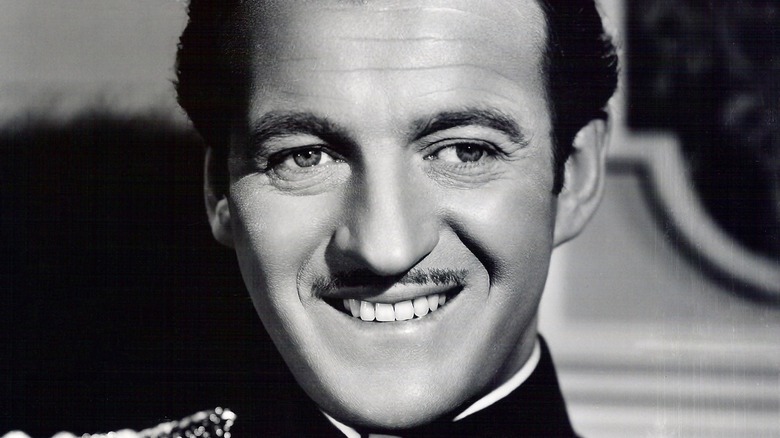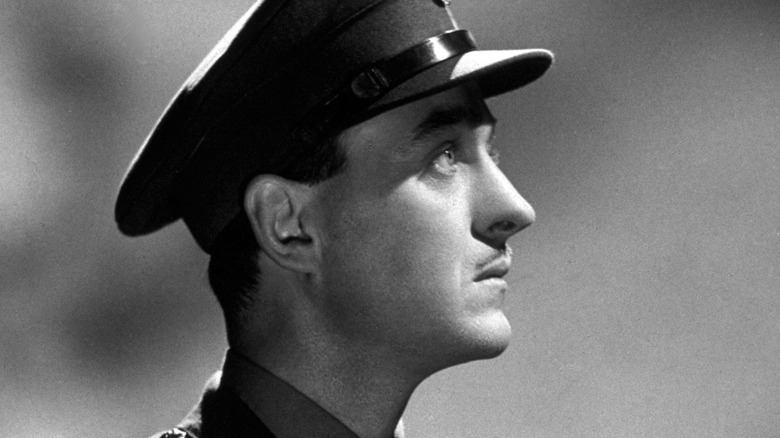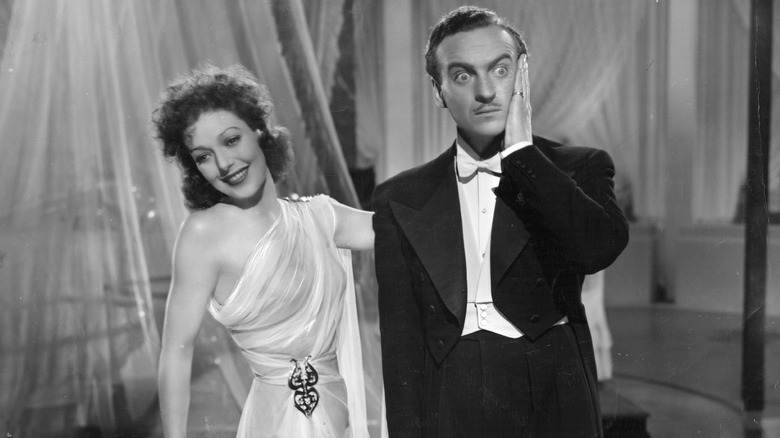How David Niven Defied The British Embassy To Fight In WWII
On September 3, 1939, two days after the Nazis invaded Poland, Britain and France declared war on Germany and the Second World War was suddenly and violently underway as Europe erupted in bloodshed. Back in Hollywood, 29-year-old British actor David Niven was finishing up filming "Raffles" when he got the news, according to The Observer. The Samuel Goldwyn production about a suave gentleman thief, played by Niven, had three more weeks of filming, and Niven, eager to join the war effort, spent his off hours trying to figure out how he could get back home, per "David Niven: A Bio-Bibliography" and The Observer.
The United States wouldn't officially join the war for more than two years, so if Niven wanted to fight the Nazi menace right away, he'd have to get home and enlist. And in order to do that, he would have to defy the wishes of the British embassy and the studio to whom he was under contract, wrestle with red tape, and a take circuitous route to England.
Drinking with a pal when war broke out
At 6 a.m., September 3, 1939, David Niven and fellow British actor Robert Coote were sleeping off a night of drinking when they received the news their country had gone to war. They were in a sloop moored at a yacht club in Corona del Mar, California when someone began banging on the side of the boat, according to the book, "David Niven: The Man Behind the Balloon," by Michael Munn. "You guys English?" a man in a small boat asked them. "We are," they responded. "Then good luck to ya — you just declared war on Germany."
Coote would soon go to Canada and join the air force. Their friend, the actor Laurence Olivier, returned to England and joined the Royal Air Force. Niven decided he would get back to the U.K. and take whatever he could get. He had been a second lieutenant in the Highland Light Infantry and had resigned his commission back in 1933 before making it in Hollywood, per Imperial War Museums (IMW), but like Olivier, he was more interested in becoming an RAF flyer.
David Niven had to fight for the right to fight the Nazis
The British consulate in Los Angeles advised Hollywood's English actors to stay in the U.S. and represent their country on film, according to "The Man Behind the Balloon." Unsatisfied with that answer, David Niven contacted the British embassy in Washington, D.C., and got a meeting with the ambassador, who reiterated the government's stance. "He was very sympathetic but advised me to stay on in Hollywood and work for the present," Niven told The Observer. "I just couldn't do it." With one hurdle out of the way Niven tried to convince producer Samuel Goldwyn to suspend his contract so he could go fight for his country.
Goldwyn refused, so Niven came up with a ruse to get his way. He had his brother send a fake cable ordering Niven back to England and his old regiment, per "The Man Behind the Balloon." The trick worked and Niven was soon on a ship to Italy, then overland to France, and finally, with the help of the RAF, on a bomber to England, where he rejoined the British Army, per The Observer. During Niven's wartime service, he took part in the D-Day landings, received the American Legion Of Merit, and attained the rank of lieutenant colonel, per IWM. After the war, he returned to Hollywood and starred in more than 60 films, including 1956s "Around the World in 80 Days," and a received an Academy Award for best actor for "Separate Tables" (1958). He died of ALS at age 73 in 1983, per The New York Times.


